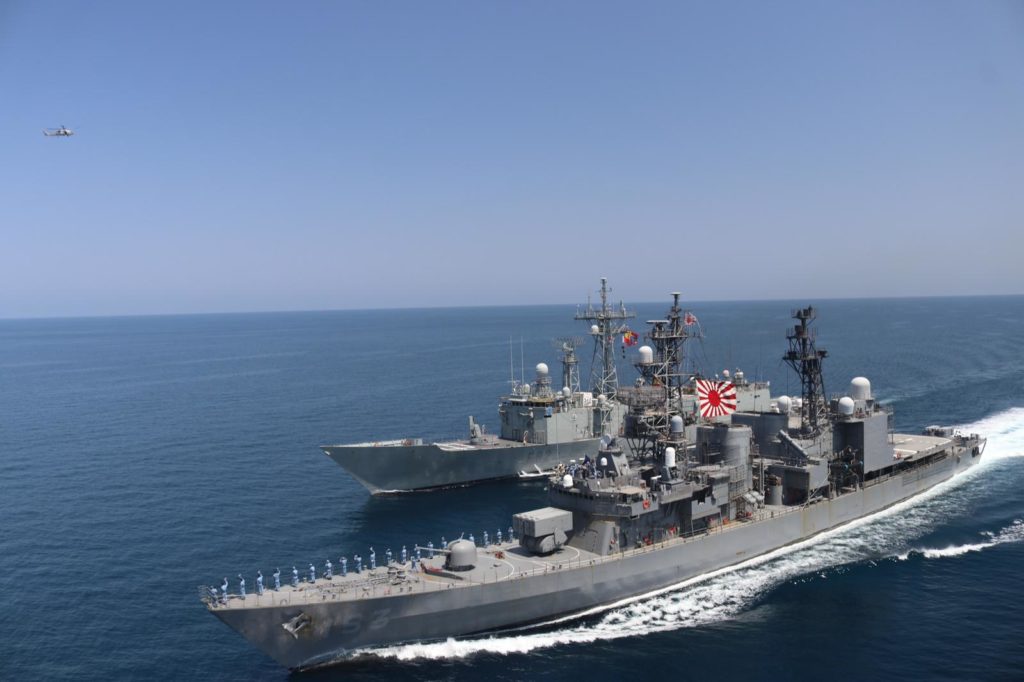A recent report finds that a large part of the European Union's military missions is related to securing oil and gas production and transport. Several EU countries are using taxpayer money for the purpose of safeguarding their energy interests.
Almost two-thirds of all EU military missions monitor and secure a gateway for these fossil fuels to Europe, despite the bloc's commitment to an ecological transition, a recent report by the Spanish, German and Italian branches of Greenpeace found. The results were based on public documents, statements from political leaders, and their listing costs.
"This report shows that many soldiers and millions of euros are being spent to provide security for ships loaded with fossil fuels that will later be burnt, further contributing to future devastation of the planet," Anna von Gall, disarmament expert at Greenpeace Germany, said to The Brussels Times.
The EU is highly dependent on fossil fuel imports – a European Parliament study found that around 90% of its oil and 70% of gas requirements are imported – meaning that it also relies on secure trade routes and stable conditions in supplier countries.
The report also shows that a global military presence as part of the EU's Common Security and Defence Policy (CSDP) is one way of securing energy supply.
Ambiguous aims
"Normally, decisions to establish and to launch missions and operations require the approval of all Member States through a Council Decision," von Gall said.
This goal of energy security is rarely mentioned explicitly in official documents. "More frequently, these aims emerge from official statements issued by politicians or military personnel or from the country's energy security strategies."
According to the report, one of the missions with the purpose of securing the flow of oil and gas is the EU anti-piracy mission named "Atalanta" at the Horn of Africa – one of the most militarised zones in the world. Launched in 2008, this mission aimed to deter, prevent and repress piracy and armed robbery at sea off the coast of Somalia.
However, when speaking about “counter-piracy operations”, in June 2021 the North Atlantic Treaty Organisation (NATO) stated that 'by protecting important sea lanes' these missions also contribute 'to energy security'.
€4 billion in taxpayer money
The report also looked at individual EU countries and their missions to secure energy interests. Since 2018, the Italian, Spanish and German governments have invested more than €4 billion of taxpayer money to protect fossil fuels.
This year, Italy, which is most upfront about the military missions with a purpose to secure energy interests, allocated 64% of its military missions budget to operations aimed at protecting the country‘s “energy security” for a total of approximately €797 million. In Spain, this was 26% for a cost of €274 million; Germany allocated 20% for a cost of €161 million.
Italy is actively engaged in two operations in the Gulf of Guinea and off the Libyan coast aimed at protecting the assets of Eni, the main national energy company. During the Defence Minister’s parliamentary hearings, it was openly revealed that energy interests are a "massive driving force behind its military mission policy."
Related News
- Renewable electricity capacity growing, but not enough for CO2 neutrality by 2050
- Nuclear talks in Vienna: Is there a common EU position?
- Energy prices: EU’s demand and supply dilemma in importing natural gas
Spain also has an active anti-piracy mission on the Gulf of Guinea where it justified deploying warships to protect Spanish oil and gas interests. In Germany, the focus is more clearly on other interests, such as keeping sea routes open.
"Our report shows how the greed for oil and gas has led Europe to develop a weaponised system at the expense of people and the planet. The harm caused by fossil fuel companies is not limited to their catastrophic emissions, they have historically driven conflict," said Silvia Pastorelli, Greenpeace EU climate and energy campaigner.
Securing supply through military force
Greenpeace submitted a request for more information on energy interests to the Italian and Spanish authorities. These were either met with no response or additional information could not be given for "security reasons."
For Greenpeace, the fact that there are no signs of a reversal in the European approach to energy security – and that military commitment to supporting energy security could even increase – is deeply worrying.
The report concluded that risking the lives of civilians and soldiers by spending scarce financial resources to protect fossil fuel supply is reminiscent of a "wrong-way driver who, despite all warnings, not only stubbornly stays in his lane, but accelerates."
Public pressure to end this strategy
It stressed that in the face of the current climate change challenges faced by Member States, the EU needs to turn away from oil and gas. Greenpeace emphasised the need for public pressure to change the course of action. If one million EU citizens sign the petition calling on the ban of these practices, the European Commission will have to consider tabling a new law.
"This will have a triple-positive effect: it will reduce the risk of military confrontation, protect the climate and save financial resources for urgent matters, such as a stronger and more just ecological transition."
In response to the claims, an EU spokesperson overseeing the CSDP told The Brussels Times that the relevant authorities have seen the report and will read it. "The aim of EU military missions and operations is to support our partner countries to promote stability and peace," the spokesperson said.

